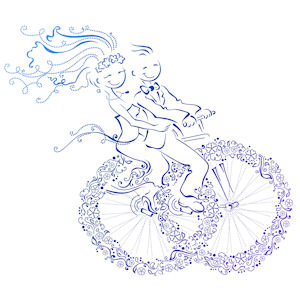Could a Tandem Wedding be Your Thing?
Categories: | Wedding Ceremony | Wedding Legals | Wedding Planning |
 If
you Google "tandem wedding" or "tandem weddings"
you'll be served pages and pages of listings about
bikes. Despite the cute graphic (I couldn't resist
the play on words) a Tandem Wedding has nothing to
do with a bicycle built for two!
If
you Google "tandem wedding" or "tandem weddings"
you'll be served pages and pages of listings about
bikes. Despite the cute graphic (I couldn't resist
the play on words) a Tandem Wedding has nothing to
do with a bicycle built for two! What is a tandem
wedding?
Two officiants or two
ceremonies?
So you basically have a choice
- two ceremonies held at different times - a
legal marriage and a non-legal wedding, or
- a tandem ceremony
How does a tandem
ceremony work?
So, the authorised celebrant
- takes care of all of the pre-ceremony legal paperwork
- provides the marriage certificates you sign on
- on the day, identifies themself to your
guests as the authorised celebrant, makes
the statement required by the Marriage Act,
and ensures that your vows meet the legal
requirements.
- signs your marriage certificates
- submits your marriage papers for registration of your marriage
Who can be involved in
a tandem ceremony?
Types of tandem
ceremony
- An interfaith wedding, where the couple
wish to involve the clergy from both
religions. Some religious denominations are
very open to this, some are not. [If this is
your wish and you come up against barriers,
it might help to know that you can have a
religious marriage ceremony, according to
the rites of that faith, even if you are
legally married. Just as long as the clergy
person is aware that you are legally married
and no legal paperwork is done]
- A religious wedding, where the
clergyperson is not authorised to solemnise
legal marriages (not all are) so a civil
celebrant is present to fulfil those
requirements. In this case, the ceremony
would follow the liturgy of the particular
denomination, but the civil celebrant would
identify themselves and ensure that the
civil legal requirements of the monitum and
the legal vows were included in the ceremony
- A wedding where the couple would like a
friend or relative to conduct a
non-religious ceremony and a civil celebrant
is present to fulfil the legal
requirements.
Who creates the
ceremony?
- writing the ceremony script
- checking the ceremony script your friend has written to ensure it is legally compliant
- providing advice as to how to improve the script your friend has written
- coaching your friend in how to deliver the
ceremony
What if something goes
awry?
Is a Tandem Ceremony a
way to save money?
Don't forget to have a
rehearsal
Related information
- Friend or Professional Celebrant? Everything you need to consider when deciding who will conduct your wedding ceremony

0 Things